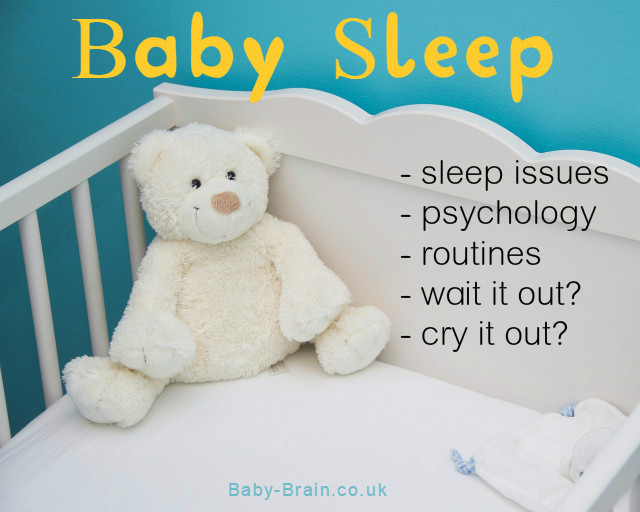So yesterday the Little Lovely and I went to a baby talk thingy about sleep (aged 5 months)
We’d actually been to it before, a couple of months ago, and the session was being run again by a sleep expert woman that you can hire the services of for quite a lot of money. She kept it quite generic as there were a lot of mothers there with various issues but some common aspects among us, mostly being that baby was not sleeping as long as we’d like them to (of course) or issues with getting baby off to sleep. It was very interesting to go, normalised the sleep issues because, as we discussed, even if you have some “friend” or mother you come across that states that their child sleeps for 12 hours at night uninterrupted, that is the exception and not the norm. I’ll add though that the babies here were probably all under 8-10 months old.
It also made me think that maybe LL’s sleeping isn’t that bad afterall! Sure, i’m up about 3 times a night to feed him and I get about 2-3 hour stretches of sleep, but some of the mothers there were up 7 times a night and one spoke about how her baby scratches himself at night and only falls asleep by scratching himself. She had to put gloves on him. The sleep lady thought that the touching and scratching was something he did to stimulate himself and help get himself to sleep and suggested a comforter with tags or something tactile on it. Interesting situation; wish we’d spoken about it more but unfortunately someone with a louder voice took up a lot of the time (as is often the case in groups) about how her child sleeps from 8 until 5am, but she couldn’t get him to sleep any later than 5am and was tired of getting up so early. Someone eventually commented, when the group couldn’t find any satisfactory solution, maybe she should be happy that her child is sleeping for 9 hours at a time because most of us are not. Harsh, but true especially when speaking to a group of sleep deprived mothers who have been deprived for about half a year or more.
Other issues we talked about:
-
sleep associations
-
independent comforters – for example using a comforter, blanket, something that is independent from you and is not the breast, being rocked by you etc, so that baby can use this to feel secure and self sooth and you do not need to be there every time he falls sleeps. We tried this with LL but it never really took off. I bought a nice comforter blanket and slept with it for a few nights (as the sleep lady recommended, to get your smell on it) and got it out when feeding LL (the sleep lady recommended actually putting it between you and baby when feeding) but he wasn’t interested. Another thing I could have done but didn’t would be to play with it with LL and associate it with fun and get him more used to it.
-
putting baby down when sleeping/drowsy – using whatever method you use for baby to get sleepy e.g. rocking, cuddles, etc, but not using these to the point where he is actually asleep and therefore teaching baby the skill of falling asleep independently (much easier said than done, of course)
-
a good bedtime routine, nap routines including use of certain words such as “sleeping time now” or any other word cues. Basically, weaving some cues into the routine so that baby can start to recognise it’s nearly sleep time by using words, song, actions like reading a book
-
something called “wake to sleep” – i’ve not heard of this, I need to look into it more (note to self – look into this)
-
shaping naps with baby after 5 months of age – this was good to hear because i was thinking that we need to start getting a good nap routine and schedule in place and LL is nearly 5 and half months.
-
start with one nap at a time, focus on it and then build on it – building on the above point, to focus on one nap and work on that to begin with – also good to hear because I have been focussing on the morning nap with LL and making sure we 1) do one! 2) he is in his cot 3) he falls asleep in his cot which he mostly does although sometimes I need to go into the bedroom and shush/pat or pick him up and comfort him a few times. We were previously doing morning naps in the buggy because LL only fell asleep by being pushed back and forth in it.
We also spoke about whether you should let your baby cry at night and there were mixed views. There was the view that “happy parent makes happy baby” and so if baby cries for a bit during “sleep training” but then sleeps better as the outcome then everyone in the family benefits. I know that this could be a contentious issue as some are very firmly no cry, and others are not. I have also come across the view that leaving baby to “cry it out” and “controlled crying” results in an eventual reduction of crying, a quieter baby and better sleeping because it actually develops learned helplessness – the baby stops crying and sleeps because they have learnt that nothing they do in the situation can help and they have no control. They have learnt this because the times that they did cry, they were left to cry, or were comforted but didn’t receieve a feed or get picked up or whatever else they were expecting. Therefore, they are helpless and give up, rather than the view that the sleep training intervention resulted in baby sleeping peacefully because they “learnt” to sleep, learnt that it is night time and therefore they should be tired and sleep.
Ψ here’s a nice short video and further info on the traditional meaning of learned helplessness, observations/research that led to the development of the term (Seligman), and it’s application to mental health (attributions)
Erm, not sure about this myself, seems bit extreme, I mean, we’re talking about behavioural aspects here. Ok, say there is a behaviour going on that is not really very nice and leads to some problems for another person, say for example, your child goes around hitting another child and screaming in their face. Most people would address this and implement some kind of behavioural strategy, maybe some kind of reinforcement or positive punishment such as telling the child off, removing a reward (negative punishment) etc.
Ψ Here’s a good page that explains positive/negative reinforcement and punishers – for example, they explain that “punishment” doesn’t necessarily mean there is a harmful or dangerous consequence, it’s a process where a consequence immediately follows a behaviour which decreases the future likelihood of that behaviour occurring. Positive punishment is where a negative consequence is put in place after the behaviour, like sending child to “time out” or telling them off, and negative punishment where a good thing or desired outcome is removed after the behaviour occurs, such as removing cake/sweets/ice cream because the child was “naughty”. Reinforcement is where behaviour increases. Positive reinforcement is where a behaviour increases because it’s followed by a positive/motivating consequence such as praise, reward, like giving a kid money (positive) for doing chores (the behaviour). Negative reinforcement is where behaviour increases because a negative consequence is removed, such as a kid does his chores (behaviour) to avoid being nagged to do it (negative).
Ψ punishers = want to decrease frequency/likelihood of a behaviour
Ψ reinforcers = want to increase frequency/likelihood of a behaviour
Anyway, what was my point~? I think it was that you might implement some kind of behavioural strategy or consequence for some behaviours but would we call the desired outcome, i.e. the kid stops screaming at and hitting the other child, an example of learned helplessness? Why implement the strategy in the first place? Well because not many people in the situation are benefiting – the other child isn’t, the parent isn’t, and what’s the child’s motivation or concern that is leading to him screaming and hitting? Because parents are “training” or “guiding” their child in something, be it sleep or other behaviours, why must the outcome be labelled learned helplessness? Each family and parent is different and has their own motivation and justification for what they do, and if by leaving their child to cry for a few minutes at a time while periodically comforting them (or not, depending on the parent), so that the outcome is that they can sleep and therefore better parent their children and cope with the day, then so be it.

I fell asleep
And so speaking of which, I’m also going to start working on some of these night time feeds because i’m not sure how good it is for either of us to be waking up every few hours. I might start with one and see what happens. Did I mention that I’ve been sleep deprived for almost half a year?
Please note: there are of course many other views and approaches to the change to one’s sleeping patterns that comes with children. See, for example, this post on something called “wait it out” (rather than cry it out, I assume).
A quote from the article (I especially like point 1 about sleep being developmental, not behavioural):
WIO or the “Wait it Out” Method of sleep training is a method with a few core beliefs:
1- Independent sleep is developmental not behavioral.
2- Needing comfort and closeness is an instinct not a preference.
3- Cries are communication not manipulation.
4- Babies can slowly and gently learn to be comfortable with independent sleep as they are developmentally ready.
5- The path each baby will take to independent sleep is unique.
6- The progression to independent sleep does not always feel like forward momentum.
Further relevant links:
-
sleep training and controlled crying information on mumsnet
-
on controlled crying, from the NHS – discussion of the research
-
a blog entry on the “wait it out method of sleep training” – is wait it out really a method? – and a list of more posts on “wait it out” from the same blog
-
an evolutionary perspective on why babies wake their mothers in the middle of the night – to breastfeed and therefore to reduce likelihood of siblings, therefore improving their chances of survival!
-
http://www.cry-sis.org.uk – the cry-sis helpline – Cry-sis offers support for families with excessively crying, sleepless and demanding babies – 08451 228 669


